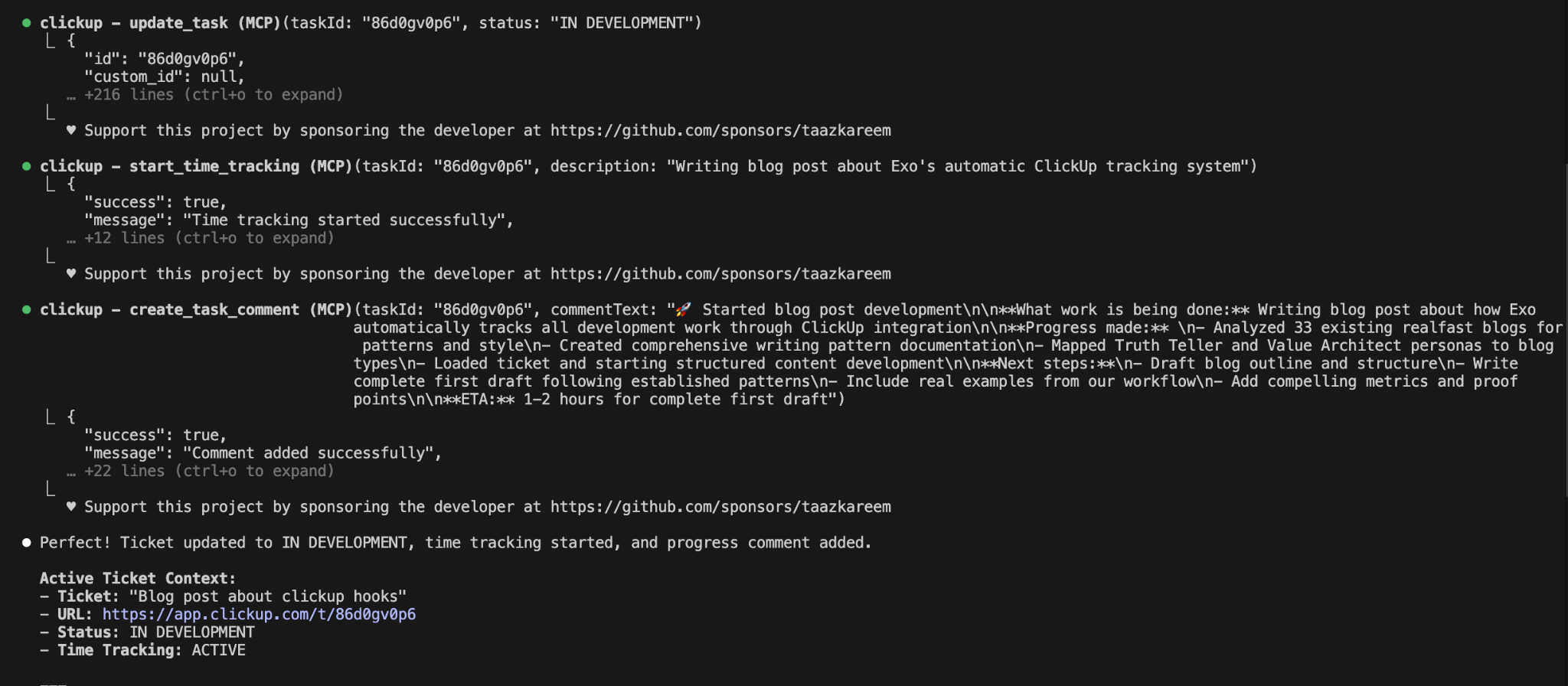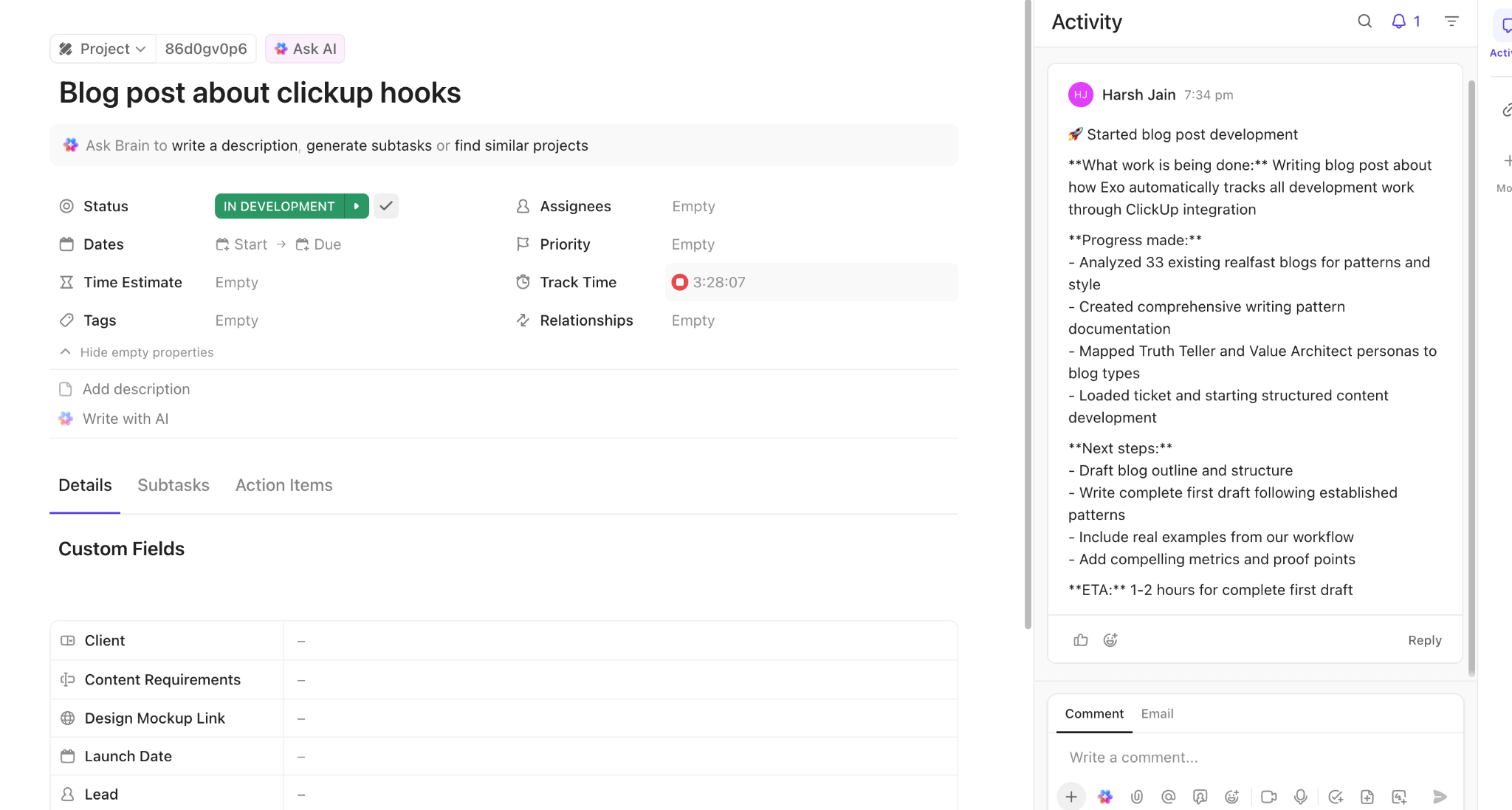Developers finish building a feature. Then comes the part everyone dreads: updating the ticket.
What’s the status? What did you actually do? How long did it take? When will it be done? Write it down, post the update, log your hours - and do it for every single task, every single day.
Nobody wants to do this. Yet every services organization depends on it happening consistently and accurately.
Asana’s research confirms what we all know: knowledge workers spend roughly 60% of their time on “work about work” - status updates, searching for information, chasing context. For services firms, that overhead means late timesheets, stale tickets, and lost revenue.
Worse, it breeds resentment. Developers resent being nagged. Managers resent having to nag. The result? Reminder Slacks, “quick sync” meetings, and endless status-chasing. Everyone ends up annoyed over busywork nobody wanted to do in the first place.
We stopped asking humans to do this
At realfast, we build AI agents for Salesforce implementations. Our team was stuck in the same trap - brilliant people spending hours updating tickets instead of delivering outcomes.
We tried the usual solutions: better templates, reminder systems, “commit to updating daily.” Nothing worked. Humans fundamentally resist repetitive administrative work, especially when they’re in the flow of building something.
So we stopped asking humans to do it. We use Exo, our internal AI agent, to handle ticket updates, time tracking, and status reports automatically. No reminders. No nagging. No resentment.
We build AI agents for clients. If we can’t automate our own operations, why would anyone trust us to automate theirs?
Watch it work
Here’s what happens when I ask Exo to build something:
I type: “Can you add validation to the contact form on the website?”
Exo asks if there’s a ClickUp ticket. I share the link.
It reads the ticket and confirms which status to move it to. I choose IN DEVELOPMENT.
Within seconds, three things happen automatically:
- Ticket status updates to IN DEVELOPMENT in ClickUp
- Time tracking starts with description “Adding contact form validation”
- Progress comment posts to the ticket with what’s being done, progress made, next steps, blockers, and ETA

Actual terminal output showing Exo’s automatic ClickUp updates happening in real-time.
Exo remembers the ticket context for the entire work session. When I continue working 30 minutes later, it doesn’t ask again. It just keeps tracking.
No duplicate prompts. No interruptions. No forgotten updates.
What changed for humans
From policing to nudging: No manager chasing for status updates. Exo asks once, at the moment you start work.
From guessing to templates: Every progress comment follows the same structured format: what/progress/next/blockers/ETA. Stakeholders know exactly what to expect.
From procrastination to defaults: Time tracking starts when work starts. Updates post when progress happens. The system creates the right defaults; humans just need to confirm.
The result? Every piece of work now has tickets, status, and time tracking - and nobody had to nag for it.
If it isn’t in the ticket, it didn’t happen. If it isn’t automatic, it won’t happen.

ClickUp ticket showing automatic progress comment with structured format - what’s being done, progress made, next steps, blockers, and ETA.
The simple math
Harvard Business Review research found that only 33% of workers consistently track their time.
For a 50-person services firm billing $150 an hour, that adds up to millions in lost revenue every year.
The reason is simple: most people fill out timesheets weekly or monthly, trying to reconstruct their week on Friday afternoon. Memory fades, details vanish - and with them, billable hours.
Automatic tracking captures work as it happens - no guessing, no gaps, no lost revenue.
Why this matters beyond realfast
Every services organization - consulting firms, implementation partners, MSPs, agencies - faces the same problem. Manual tracking fails because it depends on human memory during the busiest moments of the workday.
Being AI-native is hard. The technology is amazing, but rewiring your operations takes expertise and patience. The rewards are worth it.
Humans resist repetitive administrative tasks. We procrastinate on timesheets. We forget to update tickets. That’s fine - we should be solving harder problems and delegating this busywork to technology.
See how AI-first operations actually work
We use this system internally because it solves a real problem. If your team struggles with stale tickets, late timesheets, or lost billable hours, we’re happy to show you how we’ve solved it.
30-minute conversation. Real examples from our workflow. No sales pitch - just operational transparency from one services org to another.

